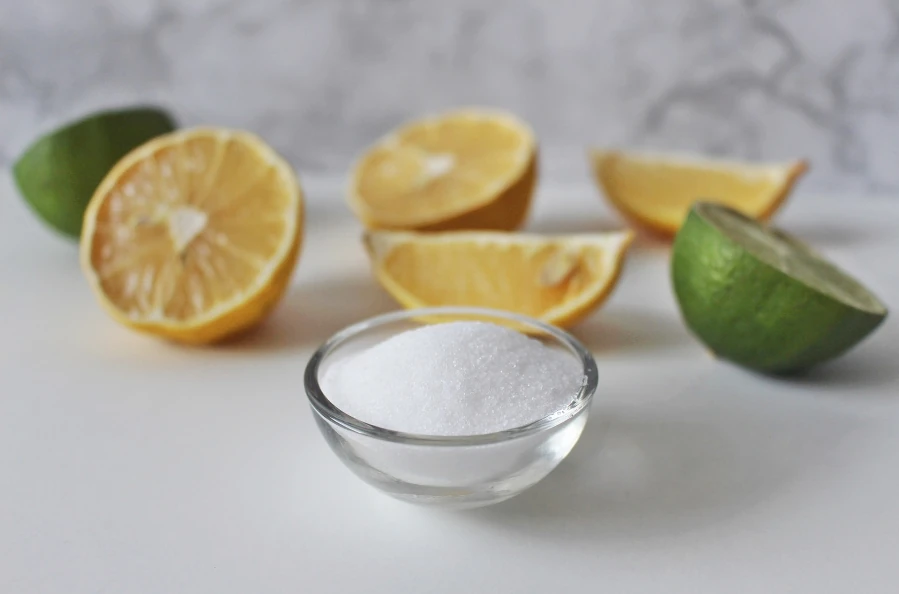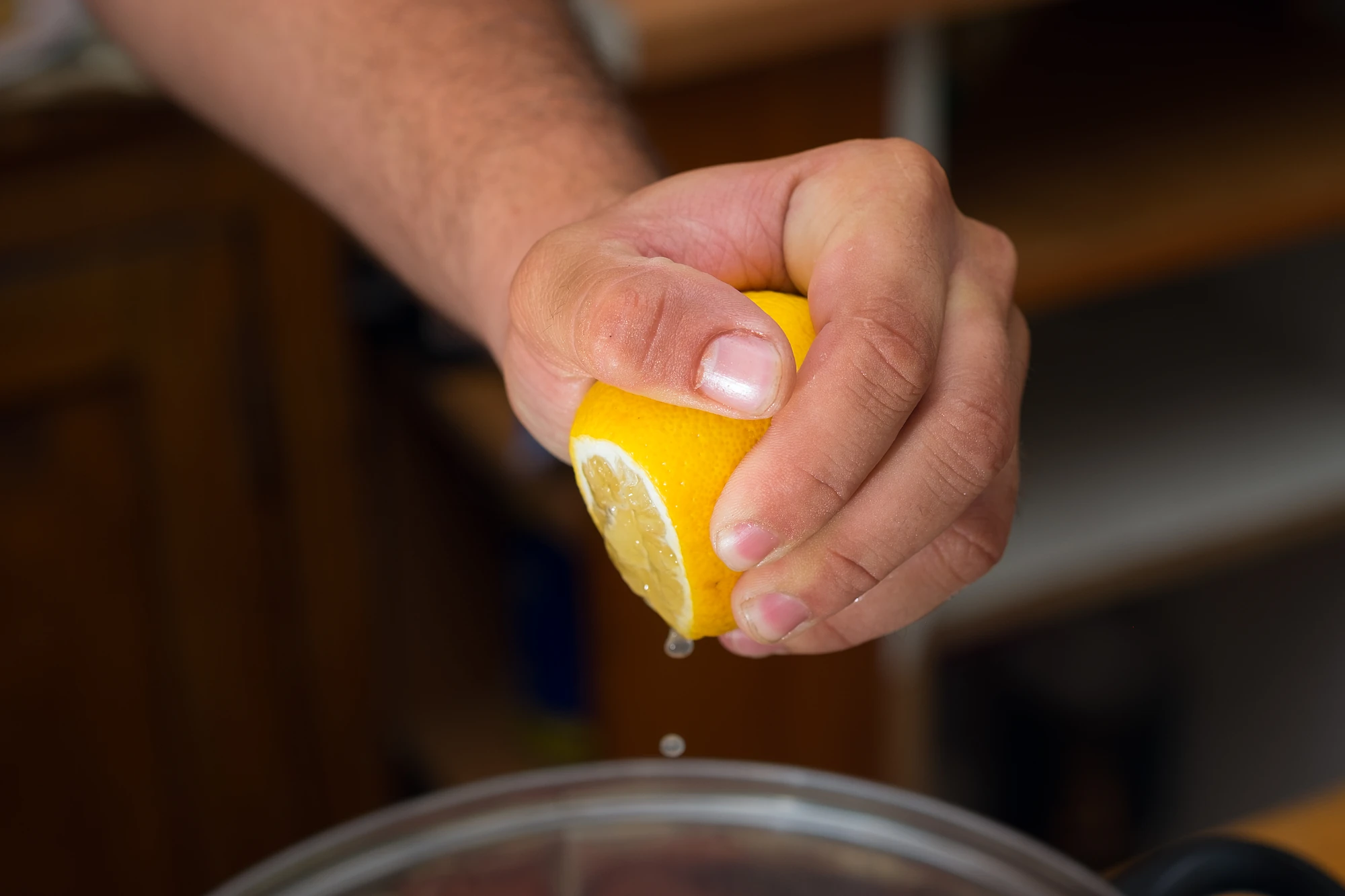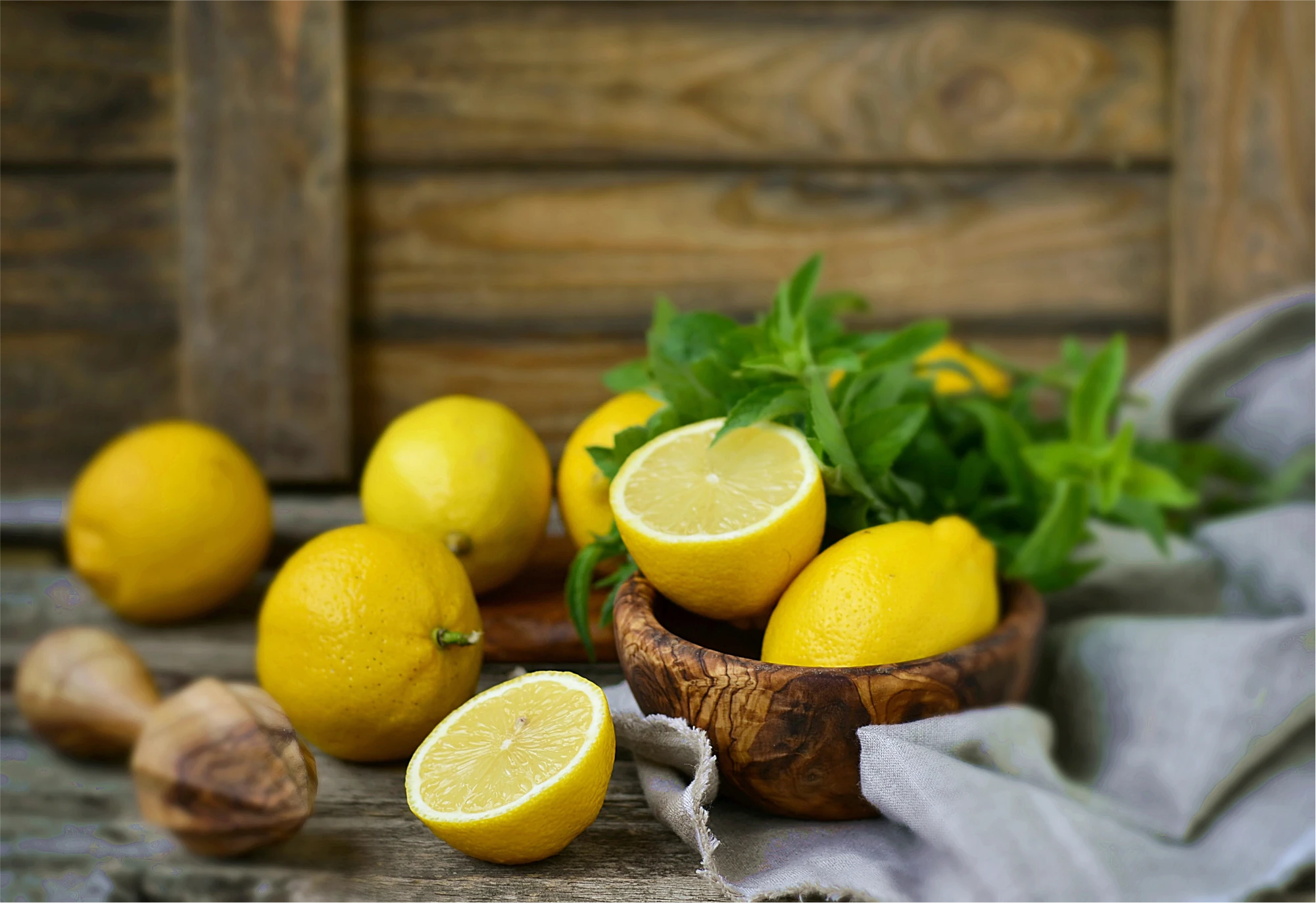


Discover the endless possibilities!
Be inspired by the incredible power of citric acid! These little yellow fruits are full of health benefits and offer numerous possibilities for use in your daily life. Citric acid is one of the main components of these delicious fruits and not only gives them their refreshing taste, but also numerous health benefits.
1. What is citric acid?
Citric acid is a natural product. It is a colourless, corrosive liquid with a slightly sour smell that occurs in lemons, among other things. The chemical formula for citric acid is C6H8O7. The substance is also found in other fruits such as limes and grapefruits, as well as in tomatoes and cucumbers. It is a natural preservative and is also used in food and drinks, for example to flavour sweets and other dishes.
2. Where can citric acid be found?
Citric acid is a natural preservative found in many food and cosmetic products. It is derived from the fruit acid of the lemon and is a very strong acid that can be used as an antiseptic, disinfectant and preservative. Citric acid is often used as an ingredient in cleaning products because it can help remove impurities and regulate the pH of the product. It can also be used as a natural emollient or exfoliant to remove dead skin cells and brighten the skin. Similarly, citric acid has many medicinal uses: it can help kill bacteria and eliminate impurities, regulate the pH of the skin and reduce inflammation. But in addition to all these practical uses, citric acid has much more to offer! It is an excellent source of vitamin C, potassium and magnesium – all nutrients that can help you stay healthy and strong. There are countless ways in which you can use citric acid in your daily life: whether on your face or in your hair – the power of citric acid can be used in a variety of ways! Whether for consumption, for external use on the body or as a cleaning agent – the possibilities for using citric acid are almost endless!
3. Food-grade or food-safe – what's the difference?
Like many other acids, citric acid is both food-grade and food-safe. But what do these terms actually mean? And what is the difference between the two? Food-grade means that the citric acid can be used in food. It is used as a preservative or acidifier in fruit juices, ketchup and much more. It is also often found in baked goods and sweets as an ingredient in the recipe. Food-safe, on the other hand, means that citric acid can not only be used in food, but is also suitable for industrial applications. For example, it can be used as a cleaning agent or to remove residues from pipes and water pipes. It can also be used as an anti-rust agent on metal surfaces. So we see that the power of citric acid offers almost endless possibilities - whether in the household or in industry. Thanks to its outstanding properties, it is possible to carry out various processes more efficiently and quickly. It is therefore an indispensable aid for every household and industry! By the way: our YVE-BIO citric acid is food safe.
4. How does citric acid affect the body?
Citric acid can do so much more than just help improve the taste of our food. It is said to have a whole range of health benefits: First of all, citric acid is a natural antiseptic and can help reduce the number of bacteria in and on the skin. This makes it a great choice for people with acne and other skin problems. It can also help to increase blood flow and speed up the healing of wounds. For people with gastrointestinal problems, citric acid can also be helpful. It is believed that it can lower the acidity in the stomach and thus alleviate constipation. Some swear by drinking a little lemon juice before eating, as this is said to strengthen the digestive tract and give them more energy. There are many other ways to benefit from the power of citric acid. It detoxifies the body, supports the immune system and is even said to help combat fatigue and stress. So, just add more lemon to your diet: drink some freshly squeezed lemon juice regularly or try new recipes with fresh lemon juice, acid or zest. The possibilities are endless – but definitely very tasty! So why not find out how you can benefit from the juice of the lemon? But be careful! Most people tolerate citric acid well. However, at high doses, it can cause gastrointestinal complaints such as nausea and vomiting. Some skin reactions are also possible. If in doubt, be sure to ask a healthcare professional for advice!
5. How does the use of citric acid affect pH?
The use of citric acid has a positive effect on pH. This is because citric acid is classified as an acid. The acidic properties of citric acid make it ideal for use in alkaline drinks. Using citric acid in alkaline drinks will lower the pH of the drinks. This means that these drinks now have a lower range of acidity and are therefore milder.
6. What kitchen equipment is needed to process and make products with citric acid?
Before you start processing and making products with citric acid, you should consider what kitchen equipment you will need. This depends on the type of product you want to make. Some basic utensils you will need for processing citric acid products are: - A scale to weigh the right amounts of ingredients. - Measuring spoons or measuring cups to measure the right amount of ingredients. - A pot or pan to heat liquids on the stove. - A mixer or blender to whip and mix liquids. A whisk to beat and mix products. A sieve to filter liquids and ensure that there are no solid particles left. Even if you don't need all of these utensils, it's worth buying one or more of these items, because the right ‘tools’ make it easier to prepare different types of products with citric acid. Plus, you can redesign and vary your favourite products over and over again or invent completely new creations!
7. How can you use the cleaning power of citric acid?
The cleaning power of citric acid can be used in many different ways. You can use it as a natural household cleaning product, but also for cleaning clothes or removing stubborn stains. First of all, it is important to understand how the acid works. When you dissolve it in a warm water bath, it develops its cleaning power. In doing so, it releases grease and dirt particles, which can then be easily removed. Due to its antiseptic properties, citric acid can help to kill germs and bacteria. There are many household uses for the acid: Citric acid as a disinfectant: citric acid is a natural disinfectant and can therefore also be used to clean dishes and kitchen utensils. Citric acid as a cleaning agent: citric acid is excellent for cleaning all kinds of surfaces. Whether tiles, glass or stainless steel – citric acid removes stains and dirt without leaving any residue. To clean your water filter system, add 1 tablespoon of citric acid to 1 litre of water (1:100 ratio). You can use this solution to clean the tanks, all plastic parts, the tap and the outside of the cartridge. Then thoroughly rinse everything under running water. Citric acid as a natural fruit stain remover: fruit stains on clothing, carpets or furniture can be easily removed with citric acid. Simply rub the stain and then rinse with water. Citric acid as a natural limescale remover: limescale deposits on taps, shower walls or tiles can be easily removed with citric acid. Simply rub the affected area and then rinse with water. Citric acid as an odour neutraliser:
Citric acid is also a true all-rounder when it comes to odour neutralisation. Simply pour a little citric acid down the drain to neutralise unpleasant odours. So there are endless possibilities for using the power of citric acid in your own four walls! It is inexpensive and very effective – why not give it a try!
9. What are some examples of how citric acid can be used to make food?
It is truly amazing how versatile citric acid can be used as a preservative and as a natural cleaning agent. But there's much more to it than that! It can be used to make a variety of foods. Here are some examples:
Lemonade: Add a little sugar and citric acid to water to make delicious and refreshing lemonade. You can also add other juices, such as orange or pineapple, for a customised taste. Jam: Mix sugar and citric acid with cooked fruit of your choice and you have made homemade jam that not only tastes delicious but also has a long shelf life.
Pickled vegetables: Vegetables rich in vitamins can be preserved by adding citric acid, keeping them fresh for a longer period of time. To do this, the vegetables must be placed in a solution of salt water and citric acid, and then the flavour of the vegetables can be rounded off with herbs and spices.
Pickled fruit: fruit can also be preserved with the help of citric acid – this way, you can enjoy seasonal fruit without it going off or spoiling. Cocktails: For a special kick in your cocktails, we recommend adding a little citric acid – this not only enhances the flavour of the drink, but also extends its shelf life!
Sauces: Sauces are a great way to make your food more interesting and tasty. With a little lemon juice and sugar, you can make almost any sauce!
Yoghurt: Yoghurt is a very healthy and nutritious food. But it can taste even better when a little lemon juice is added! Thanks to the power of citric acid, you can invent completely new dishes and optimise existing ones in terms of health – just give it a try!
10. What alternative uses are there for citric acid?
Citric acid is a very versatile and useful ingredient. It can be used in the home as well as in your daily personal care routine. One of the most popular uses of citric acid is to clean kitchen appliances and other items. With its natural disinfectant effect, it can thoroughly clean dirty dishes and cooking utensils.
Acidic soil: If you are looking for a natural way to regulate the pH of your soil, you can also use citric acid as an aid. This way, you can improve acidic soil and support root growth. Hair setting: citric acid can strengthen your hair without weighing it down or tangling it. All you need is a little citric acid and a little water. Mix them well and apply the product to your dry or damp hair.
Leave it on for about 5 minutes before washing it out. The result is beautifully shiny and smooth! Eye make-up remover: citric acid can also remove eye make-up! All you need is a few drops of citric acid mixed with water. Apply the product to your eyelids and eye rings and leave it on for 1-2 minutes.
Then rinse with warm water and the make-up is gone! In short, there are so many different ways you can use the power of citric acid! Whether it's in the home, in personal care or in the garden – citric acid is an all-rounder.
Discover the endless possibilities and be inspired! Feel free to share your tips and experiences with us, send us photos of your creations. We're excited to see them!
